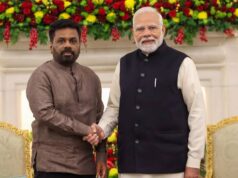Mongolia ex President says employing North Koreans would spur engagement

Tsakhiagiin Elbegdorj, who served as president of Mongolia between 2009 and 2017
A former long-serving Mongolian leader said Wednesday that his country should accept North Korean workers as a means to open the door for Pyongyang to engage with countries other than China and Russia.
Tsakhiagiin Elbegdorj, who served as president of Mongolia between 2009 and 2017, said in an interview with Kyodo News in Washington that North Korea’s deepening of relations with Russia since its invasion of Ukraine more than two years ago is “quite dangerous.”
Elbegdorj said Mongolia, which maintains close ties with both North and South Korea and is one of the few countries that have functioning embassies in Pyongyang, can continue to be an effective facilitator of global efforts to deal with North Korean issues.
Noting that North Korea is now aligned more closely with China and Russia, he said, regardless of who wins the U.S. presidential election in November, it would not be easy for Western capitals to pave the way for dialogue with Pyongyang.
But he suggested efforts to engage with North Korea in tackling outstanding issues, including its nuclear buildup and abductions of Japanese nationals in the 1970s and 1980s, should not be given up.
“I have one wild idea…I think Mongolia should allow, maybe it’s good or not, I don’t know, North Korean workers to come to Mongolia,” said Elbegdorj, who played a pivotal role in leading his country’s peaceful transition to democracy and a market economy from decades of communist rule, following the collapse of the Soviet Union in 1989.
Asked what kind of role Mongolia could play, he said, “When they come to Mongolian streets, when they see Mongolian people, they can see that North Korea also can make that transition.”
He said many companies in Mongolia want to have North Korean workers and this kind of initiative can provide an “eye-opening experience.”
The 61-year-old, who was also prime minister of Mongolia before serving as president, said he had always told North Korean leaders to open up their economy a bit more for the benefit of its people.
Japan and the United States view Mongolia, landlocked between China and Russia, as strategically important in geopolitical and economic terms.
Japan, which has no diplomatic ties with North Korea, has often sought Mongolia’s cooperation as a mediator to help resolve the abduction issue.
Senior officials of Japan and North Korea have held formal as well as secret talks in Mongolia in the past.
With the old age of many of the abductees’ relatives adding urgency to the Japanese government’s efforts to resolve the issue, Prime Minister Fumio Kishida has reiterated his readiness to meet with North Korean leader Kim Jong Un without preconditions.
Japan officially lists 17 nationals as abductees but suspects Pyongyang’s involvement in many more disappearances.
While five of the 17 were repatriated in 2002, North Korea has consistently insisted that eight have died and four others never entered the country.
In the summer of 2015, Elbegdorj disclosed that he had sent a letter containing a “specific proposal” on moving forward on the abduction issue to the North Korean leader. He did not elaborate at the time.
During the latest interview, Elbegdorj said the proposal concerned Mongolia’s willingness to enable negotiations between Japan and North Korea but he does not remember its substance.
In any case, to improve the situation with regard to North Korea, Elbegdorj, a zealous proponent of nuclear nonproliferation and disarmament, said, “Our government and our foreign minister should be very proactive.”
Now teaching at Stanford University, the former Mongolian leader added, however, that trying to realize talks with North Korea without preconditions would be an unwise approach and “a waste of time.”




